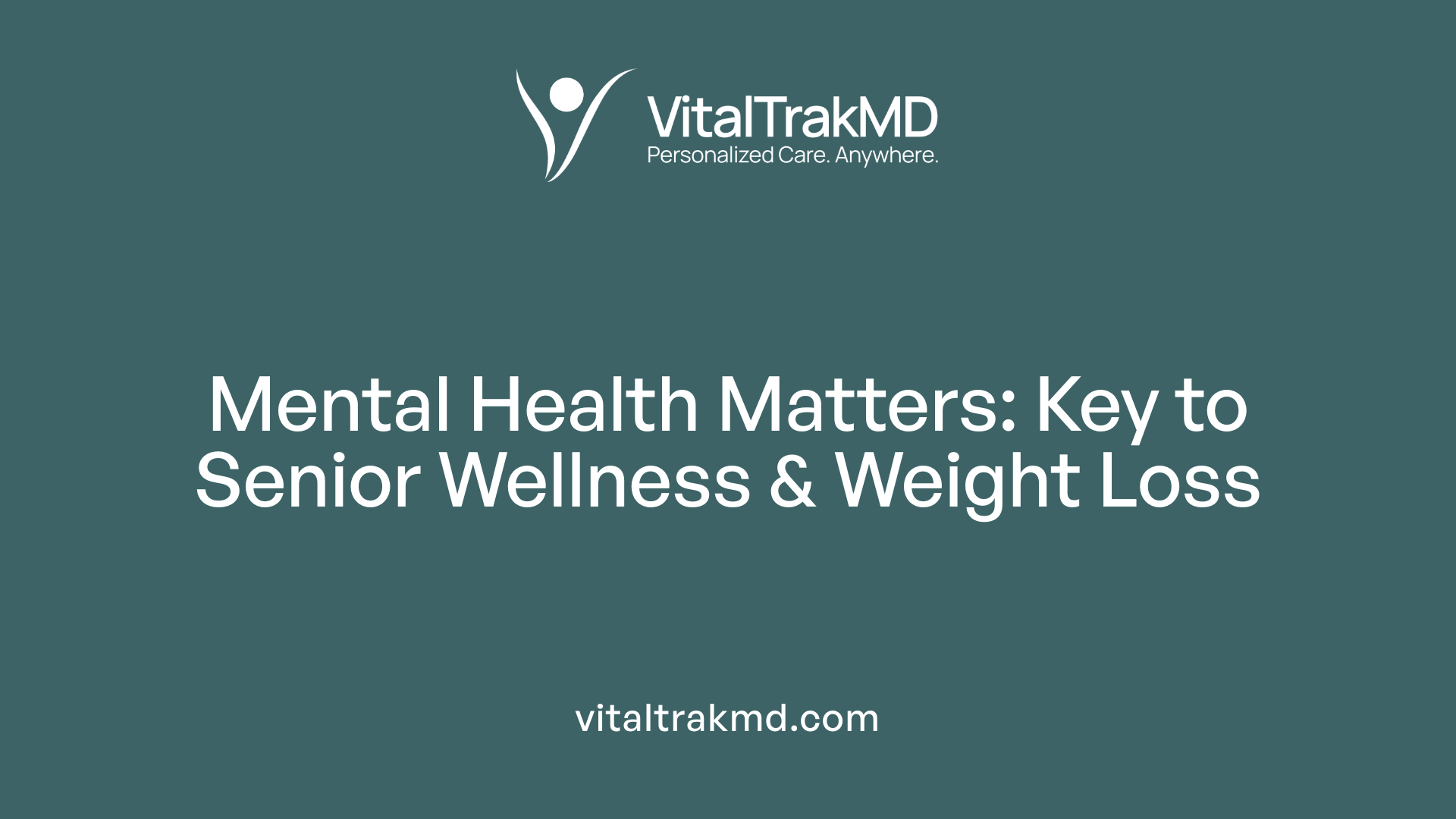Encouraging Seniors to Prioritize Preventive Care Through Hybrid Health

Bridging Traditional and Modern Care for Senior Wellness
As the population ages, ensuring seniors have access to effective preventive care is critical for sustaining their independence and quality of life. Hybrid health models, combining both in-person and digital wellness solutions, are revolutionizing how seniors engage with preventive healthcare, offering tailored programs that address physical, mental, and social well-being. This article explores how these approaches support seniors in prioritizing preventive care and embracing healthier lifestyles.
Holistic Wellness Strategies for Sustained Senior Health

What are the most effective wellness strategies for long-term health?
Achieving long-term health and vitality for seniors involves a comprehensive wellness approach that integrates various lifestyle aspects. Regular physical activity is fundamental, with guidelines recommending at least 150 minutes of moderate exercise per week, including strength training for all major muscle groups. Activities like walking, balance training, and tailored fitness programs can boost strength, improve balance, and reduce fall risks.
Nutrition plays a crucial role as well. Seniors benefit from nutrient-dense diets rich in fruits, vegetables, lean proteins, whole grains, and healthy fats. Such diets help lower cardiovascular disease risks, improve energy levels, and maintain healthy body weight, which supports independence.
Managing stress through mindfulness techniques such as meditation, deep breathing exercises, or engaging hobbies can reduce anxiety and promote emotional well-being. Likewise, nurturing strong social connections combats loneliness and depression, significantly impacting both mental and physical health.
Regular health screenings and preventive care—including vaccinations, cancer screenings, and dental care—are essential for early detection of conditions and reducing complications. Personalized care plans, frequent interactions with healthcare providers, and patient education empower seniors to actively manage their health.
Implementing these strategies gradually, supported by community resources and wellness programs, ensures sustainability. Programs like community-based fitness classes, nutrition counseling, and mental health support foster adherence and enhance quality of life.
| Wellness Aspect | Recommended Actions | Benefits |
|---|---|---|
| Physical Activity | 150 minutes moderate exercise weekly, strength & balance training | Improved strength, balance, reduced fall risk |
| Nutrient-Rich Diet | Emphasis on fruits, vegetables, lean proteins, whole grains | Lower cardiovascular risk, better energy, weight management |
| Stress Management | Mindfulness, meditation, hobbies | Reduced anxiety and depression |
| Social Connections | Engage in community programs, maintain strong relationships | Improved mental health, reduced isolation |
| Regular Health Screenings | Vaccinations, preventive screenings, dental care | Early illness detection, prevention of complications |
By embracing this holistic wellness strategy, seniors can enjoy improved physical health, emotional well-being, and greater independence over the long term.
Tailoring Weight Loss Programs to Meet Individual Senior Needs

How can weight loss programs be tailored to individual needs for better success?
Effective weight loss programs for seniors often require personalization to address unique lifestyle, dietary preferences, medical histories, and psychological factors. By crafting weight loss plans built around these elements, programs can better support seniors’ adherence and achieve meaningful results.
Behavioral and psychological factors are significant in shaping success. Addressing habits, motivation, and mental health contributes to sustainable changes. Wellness programs that integrate these dimensions tend to empower seniors with the skills and confidence needed for lasting weight management.
Digital interventions have expanded the scope and accessibility of personalized weight loss support. Mobile apps, virtual workshops, and hybrid digital-in-person platforms enable tailored guidance at scale, enhancing engagement and convenience. These tools offer continuous feedback, self-monitoring, and social encouragement that adapt to individual progress.
Evidence supports the effectiveness of such approaches. Programs like WeightWatchers demonstrate that personalized digital weight loss initiatives can result in clinically meaningful reductions in weight—averaging between 4.25% and 5.05% over six months. Over half of participants achieved substantial weight loss while also improving dietary quality and increasing physical activity levels, boosting overall health outcomes.
While these developments are promising, ongoing research focuses on optimizing personalization methods and verifying long-term effectiveness across diverse senior populations. As innovations continue, combining personal tailoring with supportive digital tools remains key in advancing weight loss programs that truly meet the complex needs of older adults.
Comprehensive Care Programs Supporting Sustainable Weight Management

What types of care programs support sustainable weight management?
Sustainable weight management programs typically combine several components that address nutrition, behavior, physical activity, and ongoing support. Nutritional counseling plays a central role, helping individuals understand healthy eating patterns, portion control, and nutrient-rich food choices. Behavioral modification strategies aid participants in adopting long-term changes by focusing on habits, motivation, and coping skills.
Guidance on physical activity encourages regular exercise that fits each individual's abilities and lifestyle, improving energy expenditure and overall fitness. Ongoing monitoring and support from healthcare providers or wellness coaches allow for personalized adjustments and motivation over time.
Digital tools enhance these programs by enabling tracking of food intake, physical activity, and weight changes. They also provide access to educational resources and virtual coaching, which improves engagement and adherence.
Evidence-based lifestyle approaches, such as those promoted by leading health organizations, integrate these elements to foster gradual, realistic progress. Programs emphasize healthful eating, increased physical movement, and behavioral changes supported by professional help. These comprehensive care models ultimately aim to improve health outcomes and maintain weight loss long-term through a combination of education, support, and personalized strategies.
The Crucial Role of Mental Health in Wellness and Weight Loss for Seniors

How does mental health influence wellness and weight loss outcomes?
Mental health profoundly shapes a senior's ability to pursue wellness and weight loss. It impacts motivation levels, emotional eating, and the ability to regulate stress, which are critical factors in behavioral change and sustained health improvements.
Stress, anxiety, and depression often trigger unhealthy behaviors such as emotional eating or skipping essential self-care routines. These behaviors can stall or even reverse progress toward weight loss and overall wellness.
Effect of stress and anxiety on eating behaviors
Seniors struggling with high stress levels may turn to food for comfort, leading to overeating or poor dietary choices. Anxiety can disrupt appetite regulation, causing fluctuations that make it challenging to maintain a healthy weight.
Moreover, stress hormones can affect metabolism and fat storage, creating physiological barriers to weight loss.
Integration of mental health support in care programs
Programs like those supported by NCOA and Blue Shield of California incorporate mental health services to address these challenges. Counseling, therapy, and support groups provide seniors with tools to manage mood and stress effectively.
This integration helps enhance participation in chronic disease self-management, improves adherence to nutrition and fitness plans, and supports weight loss efforts.
Benefits of counseling and support groups
Counseling offers personalized strategies for coping with emotional triggers and developing healthier habits. Support groups create connections that reduce feelings of isolation and encourage accountability and motivation.
Collectively, these interventions contribute to better mental well-being, which correlates with improved physical health outcomes, including sustained weight loss and enhanced vitality.
| Aspect | Impact on Seniors' Wellness and Weight Loss | Program Examples |
|---|---|---|
| Mental health and motivation | Influences willingness and energy to engage in health behaviors | NCOA wellness programs, Blue Shield services |
| Stress-related eating behaviors | Leads to emotional eating and challenges in appetite regulation | Counseling, support groups |
| Mental health integration | Supports comprehensive care improving consistency in health routines | CDSME, Wellvolution®, telemedicine access |
| Counseling and support groups | Enhance coping skills, reduce isolation, and foster sustained engagement | ChenMed frequent visits, KFHC education |
Leveraging Hybrid Health Solutions to Enhance Preventive Care Access for Seniors

How are digital and in-person services combined in hybrid health models?
Hybrid health models blend digital platforms and in-person care to provide comprehensive preventive care for seniors. Programs like FitOn Health offer both virtual and face-to-face wellness activities, supporting physical activity while fostering social connections. This combination allows seniors to engage in fitness, health education, and social support regardless of mobility or geographic constraints.
What benefits does telemedicine provide in senior preventive care?
Telemedicine services deliver 24/7 access to primary care, specialists, and mental health professionals through virtual consultations. For seniors, this means quick management of health concerns, ongoing monitoring, and timely interventions without the need for travel. Telemedicine complements in-person services by increasing healthcare accessibility and reducing hospitalization risks.
How do community-based health education and wellness programs support seniors?
Organizations such as NCOA and Kern Family Healthcare utilize community programs to offer education on chronic disease management, fall prevention, nutrition, and mental health. These initiatives incorporate wellness activities like fitness classes and self-management tools, empowering seniors to maintain independence and prevent injuries.
In what ways are databases used to maintain quality in wellness programs?
Databases like NCOA's HAPID track participation and outcomes in wellness and fall prevention programs. This data-driven approach ensures quality assurance, program improvement, and accountability, enhancing the effectiveness of preventive care for seniors.
How do hybrid health solutions address social determinants of health?
By integrating healthcare access with community resources, hybrid models tackle social determinants such as transportation, housing, and social isolation. Programs often include interpreter services and partnerships that improve seniors’ ability to follow care plans. Addressing these broader factors contributes to better health outcomes and sustained well-being.
| Aspect | Description | Example/Benefit |
|---|---|---|
| Digital + In-Person Care | Combines telehealth with onsite wellness programs | Increased access and social engagement |
| Telemedicine Availability | Virtual visits with healthcare providers available 24/7 | Timely interventions, reduced hospital visits |
| Community Education | Local programs offering disease management and health classes | Empowerment and injury prevention |
| Data Tracking | Use of databases like HAPID for monitoring program outcomes | Quality control and improved effectiveness |
| Addressing SDOH | Integration of social support and healthcare services | Improved adherence to care and reduced health disparities |
Community Partnerships and Social Engagement: Pillars of Senior Wellness

How do community partnerships address social determinants of health for seniors?
Social determinants of health (SDOH)—such as housing stability, transportation access, and neighborhood safety—play a major role in senior wellness. Organizations like NCOA and healthcare providers proactively tackle these factors to improve older adults' health outcomes. By integrating community-based resources, they ensure that seniors can adhere to care plans despite these barriers.
For instance, Medicare Advantage plans and community programs offer transportation assistance to medical appointments, overcoming common accessibility challenges. Holistic approaches also consider economic and environmental conditions affecting seniors, supporting them beyond medical needs.
What is the role of community-integrated healthcare in supporting aging in place?
NCOA promotes community-integrated healthcare models that enable seniors to remain independent at home. These partnerships connect health services with local organizations offering health education, vaccination clinics, mental health support, and fall-prevention initiatives.
Comprehensive wellness databases like NCOA's HAPID track program effectiveness and help tailor interventions to community needs, creating accountability and continual improvement. This model fosters personalized preventive care and chronic disease management within the community setting.
Which programs foster social connections among seniors?
Social engagement programs encourage seniors to form meaningful community bonds, which improve mental and physical health. Initiatives such as group fitness classes, cognitive support activities, and social clubs reduce feelings of isolation and depression.
Platforms like FitOn Health offer hybrid (digital and in-person) wellness options, combining physical activity with social interaction to boost overall well-being and reduce anxiety.
What physical activity promotion campaigns benefit older adults?
Campaigns like Move Your Way® provide free resources—fact sheets, videos, interactive tools—to motivate physical activity tailored specifically for older adults. Complementary strategies from the Physical Activity Guidelines for Americans Midcourse Report encourage policy and environmental changes in senior-focused settings to increase daily exercise.
Regular activity supports strength, balance, and endurance, directly lowering fall risks and sustaining independence.
How do interpreter and fitness services enhance access to wellness programs?
Many senior wellness initiatives, including those by Kern Family Healthcare, provide interpreter services to break language barriers, ensuring diverse populations can fully engage with health education and preventive care.
Access to fitness amenities, sometimes at discounted rates, promotes active lifestyles regardless of socioeconomic status. These comprehensive services help create inclusive environments where seniors receive culturally sensitive support.
| Aspect | Initiative/Provider | Description/Benefit |
|---|---|---|
| Social Determinants of Health | Medicare Advantage, NCOA | Transportation support, housing considerations, and community resources reduce health access barriers |
| Community-Integrated Healthcare | NCOA, HAPID database | Tailored wellness programs for chronic disease and fall prevention within the community |
| Social Engagement | FitOn Health | Hybrid wellness platforms that combine exercise and social interaction |
| Physical Activity Campaigns | Move Your Way®, Physical Activity Guidelines | Evidence-based resources and environmental strategies that encourage elder exercise |
| Interpreter & Fitness Services | Kern Family Healthcare | Language assistance and discounted fitness programs to enhance accessibility and participation |
Advancing Senior Wellness Through Integrated Preventive Care
Encouraging seniors to prioritize preventive care requires a comprehensive approach that addresses their unique physical, mental, and social health needs. Hybrid health models combining digital tools and in-person support enable personalized, accessible, and effective care programs that promote wellness, sustainable weight management, and mental health support. By fostering strong community partnerships and addressing social determinants of health, these initiatives empower seniors to maintain independence and improve quality of life. As healthcare continues to evolve, embracing these hybrid strategies will be essential in meeting the growing demand for proactive senior care and enhancing longevity.
References
Recent articles
Want to Feel Better and Live Healthier?
Join hundreds of patients taking control of their health with personalized care that fits their life – not the other way around.
Rated 4.8/5 by 32+ customers







